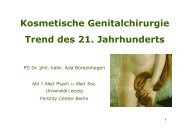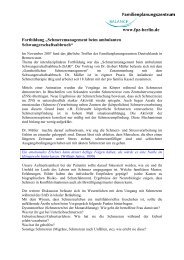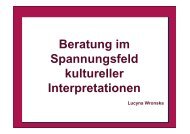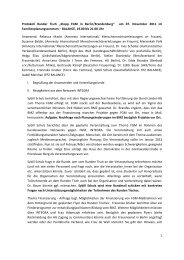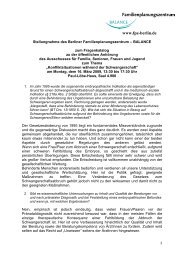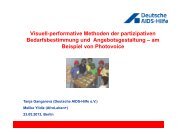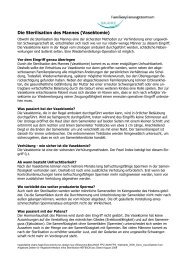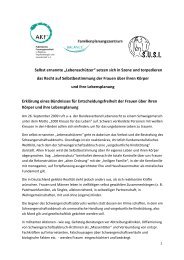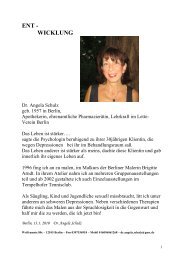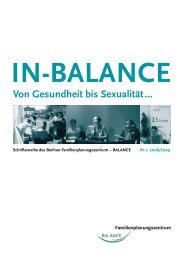Listening to African Voices - FPZ
Listening to African Voices - FPZ
Listening to African Voices - FPZ
You also want an ePaper? Increase the reach of your titles
YUMPU automatically turns print PDFs into web optimized ePapers that Google loves.
2Introduction2.1 BackgroundFemale genital mutilation/cutting (FGM/C) is a harmful traditionalpractice consisting of the removal of part or all of a girlor woman’s external genitalia. FGM/C is common in manysocieties in Africa and <strong>to</strong> some extent in Asia. Within practicingcommunities, FGM/C is a deeply rooted and acceptedtradition. Adherents consider it an important cus<strong>to</strong>m for thesocialisation of girls and young women, preparing them for alife as faithful and honourable daughters, wives and mothers.Non-practitioners, human rights and gender-equity activistscondemn FGM/C as a violation of fundamental human rightssuch as the right <strong>to</strong> bodily integrity and protection againstviolence.While FGM/C used <strong>to</strong> be considered an “<strong>African</strong> phenomenon”,it has become a global issue in the context of migration.Thousands of <strong>African</strong> migrants arrive in Europe everyyear. In <strong>to</strong>tal, there are about five million <strong>African</strong> immigrantsregistered in EU member states and it is believed that thereare millions of irregular <strong>African</strong> immigrants living in the EU.Most of them migrate for labour, hoping <strong>to</strong> make a betterliving than in their country of origin. Among the immigrantsfrom Sub-Saharan Africa and from Egypt, many have rootsin communities and families that practice FGM/C. In thepast decades, several incidents of girls from Sub-SaharanAfrica being subjected <strong>to</strong> FGM/C in Europe have made theheadlines. In France, over 30 cases of FGM/C were brought<strong>to</strong> court and the culprits – parents and practitioners – weregiven prison sentences. Anecdotal evidence of FGM/C beingpracticed among immigrants has appeared in other EUcountriesas well.Nonetheless, the data on perceptions, attitudes and practicesrelating <strong>to</strong> FGM/C of immigrants with roots in practicingcountries is limited and focuses mainly on populations fromEritrea and Somalia. In the specific case of Germany, thegovernment, non-governmental organisations (NGOs) andcivil society lack effective approaches for tackling the issue.Therefore, Plan Germany in partnership with the HamburgerBehörde für Soziales, Familie, Gesundheit und Verbraucherschutz(BSG) (Department of Social and Family Affairs,Health and Consumer Protection) developed a pilot projectfor one of Germany’s major cities, Hamburg. The aim was<strong>to</strong> establish an action plan against FGM/C in collaborationwith members of immigrant populations from practicingcountries.2.1.1 PlanPlan International, one of the oldest child-focused organisationsin the world, supports development programs in48 countries. Plan is an organisation without religious orpolitical affiliation. It finances sustainable and child-focusedself-help projects mainly by means of sponsorship, but alsothrough grants and public funds. Plan Germany supportsmore than 300,000 of the 1.2 million sponsored childrenworld-wide, thus reaching more than two million people inthe program areas of Asia, Africa and Latin America. Theprojects are being planned and carried out in close cooperationwith the children, their families and their communities.The aim is <strong>to</strong> improve the living conditions of the peoplein a sustainable way. Plan’s child protection work in Africaincludes support <strong>to</strong> community based and national initiatives<strong>to</strong> s<strong>to</strong>p FGM/C and any other form of abuse or violenceagainst children.Plan is recognised as a private and independent organisationby the Economic and Social Council (ECOSOC). The GermanCentral Institute for Social Affairs (DZI) has conferred PlanGermany its donation seal, which confirms transparency andefficiency in the field of donations.2.2 Project objectivesThe main purpose of the project was <strong>to</strong> develop an effectiveand locally adapted approach <strong>to</strong> promote the abandonmen<strong>to</strong>f FGM/C among immigrant groups in Hamburg.The specific objectives were as follows:• To assess the proportion of immigrants with roots in practicingfamilies in Hamburg;• To explore the attitudes, perceptions and opinions amongimmigrants from Sub-Saharan Africa <strong>to</strong>ward FGM/C,notably the advantages perceived, the position of theirreligion on FGM/C and the proportion of supporters andopponents of the practice;• To provide an estimation of the proportion of girls andwomen concerned from different countries of origin;• To assess the ratio and profile of girls at risk;• To investigate whether families subject their daughter(s) livingin Hamburg <strong>to</strong> the practice and if yes, how they proceed;• To establish profiles of low- and high-risk communities (bycountry and region);<strong>Listening</strong> <strong>to</strong> <strong>African</strong> <strong>Voices</strong> 9





